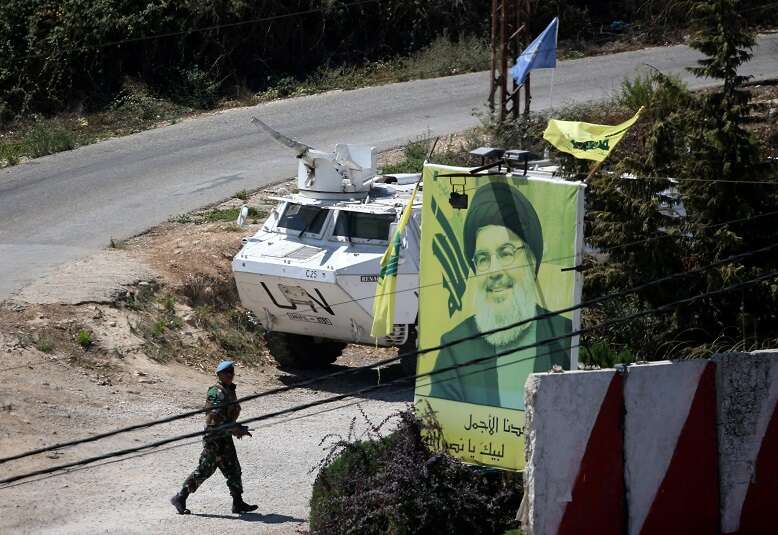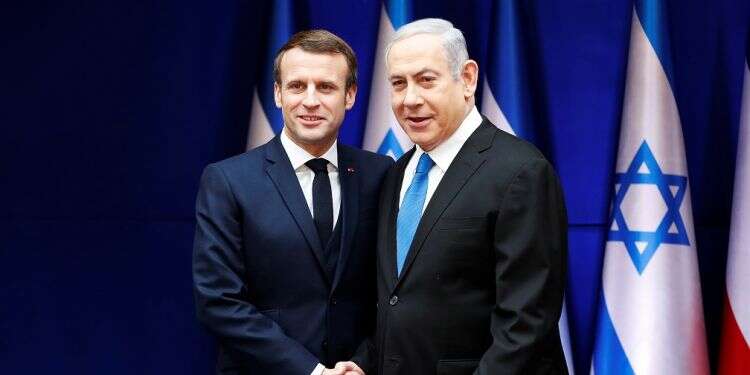Hezbollah's missiles and other weapons must be removed from populated areas in Lebanon, Prime Minister Benjamin Netanyahu told his French counterpart Emmanuel Macron in a phone call Tuesday.
Netanyahu praised the French president for his "demonstration of leadership" in Lebanon following the devastating explosion at the Beirut port last week, and said Israel's offer of humanitarian assistance to the people of Lebanon was still on the table.
Follow Israel Hayom on Facebook and Twitter
The Beirut port explosion caused more than 170 deaths, injured thousands, and left hundreds of thousands of people homeless.
However, the prime minister warned that "Hezbollah is sorely mistaken if it thinks it can solve the crisis in Lebanon by creating a crisis with Israel.

"I expressed Israel's willingness to send humanitarian aid which must be delivered directly to the population," Netanyahu said later on Twitter.
Meanwhile, the UN Security Council remains at odds over the way the UN peacekeeping mission in southern Lebanon operates on the ground, with the United States backing Israel's demands for major changes.
At a closed council meeting Tuesday on the mission known as UNIFIL, whose mandate is up for renewal at the end of the month, US Ambassador Kelly Craft stressed the need for a new mandate.
"The US has long reiterated publicly and privately that the status quo in Lebanon is unacceptable," Craft said in a statement after the meeting. "Now is the time to empower UNIFIL, end the long complacency, and enable the mission to fully achieve what it was set out to accomplish."

But Craft faces an uphill struggle because most of the council back a continuation of the current UNIFIL mandate.
UN Secretary General Antonio Guterres has written to the council calling for a 12-month renewal of UNIFIL's mandate, stressing the importance of maintaining high troop strength.
UNIFIL's mission was expanded after the 2006 Second Lebanon War between Israel and Hezbollah so that peacekeepers could deploy along the Lebanon-Israel border to help Lebanese troops extend their authority into their country's south for the first time in decades. UNIFIL, however, is largely powerless in southern Lebanon due to Iran-backed Hezbollah's dominance in the area.
Israel has repeatedly accused Hezbollah of impeding the peacekeepers from carrying out their mandate.
Germany's deputy UN ambassador Günter Sautter told the council in remarks circulated by the country's UN mission that "recent tensions and the danger of escalation only underline the importance of UNIFIL presence on the ground." He said "the new political reality" since last week's devastating explosion at Beirut's port made it "more important than ever."
"UNIFIL's mandate continues to be of utmost importance," Sautter said. "It is clear that UNIFIL will not be able to do more with less. We therefore fully support UNIFIL in its current mandate and strength, and we hope that the council will once more show unanimous support to this important mission."
Israel's former ambassador to the UN, Danny Danon, said in May that Israel will insist that peacekeepers have access to all sites, that they have freedom of movement and that any time they are being blocked the UN Security Council must be immediately informed.
Craft said at that time that UNIFIL was being "prevented from fulfilling its mandate" and Hezbollah had "been able to arm itself and expand operations, putting the Lebanese people at risk."
She said the Security Council "must either pursue serious change to empower UNIFIL or realign its staffing and resources with tasks it can actually accomplish."
Subscribe to Israel Hayom's daily newsletter and never miss our top stories!
France is expected sometime this week to circulate a draft resolution to continue UNIFIL's operations, and diplomats are predicting tough negotiations before the mandate expires on Aug. 31.
As of June 15, UNIFIL comprised 10,275 military personnel from 45 troop-contributing countries, 238 international civilian staff, and 580 national civilian staff.




